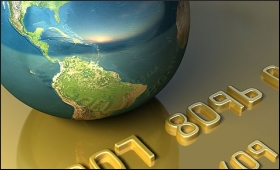|

|
Getting paid when trading with overseas customers
|
|

|
|
| Top Stories |
 |
|
|
|
Writuparna Kakati | 09 Jun, 2009
Exporting is an excellent way of expanding your business. But as soon as you start trading with overseas customers, you find that things just don't happen in the real world the way as told in business textbooks. You face myriad of galling challenges and one among them is chasing outstanding invoices.
Timely payment is essential for the survival of businesses, particularly for Small and Medium Enterprises (SMEs) which usually desperately need to maintain a positive cash flow to keep their businesses going. It is therefore crucial for SMEs to keep control of the payment arrangements they make with their overseas customers. But how can an exporter ensure that he gets paid for overseas sales? It involves assessing risks, settling on acceptable payment terms and considering insurance for protecting a business from such risks.
It is important to access the financial position and creditworthiness of an overseas buyer to minimise the possibility of non-payment. Besides fraud, the most common causes of non-payment is the buyer becoming insolvent. So, it is advisable not only to carefully check the trustworthiness of a potential overseas buyer but also to carry out a credit check on the customer. Before signing any contract, check the address of the customers and request as much information as possible. The better you know your customers, the more secure your transactions are. You may also consider taking help of professional firm to check the creditworthiness of a potential customer.
International trade involves a range of different payment terms. As an exporter, you must recognize which payment terms is secure for you and which is not. There are primarily four main transaction types: (i) payment in advance (payment before dispatching goods), (ii) documentary collection (payment becomes due when the customer accepts ownership of the goods), (iii) documentary credits (the customer arranges a letter of credit with their bank, which pays a bank in your country once the requisite necessary paper-works and the documents are accepted), and (iv) open account (goods are supplied and you invoice the customer stating when you expect to receive payment).
Among the four transaction procedures mentioned above, 'payment in advance' is the safest while 'open account' is the least secure method for an exporter. On the other hand, for an importer or buyer, the most secured method is what is the least secured for an exporter- and vice versa. Most international trade transactions are carried out usually balancing the risks of both exporters and importers.
While selling overseas, you, as an exporter, need to have efficient credit control procedures. It should be kept in mind that each and every transaction procedure in international trade is time consuming, and therefore, you must must have enough resources to support your business activities until you are paid. Before agreeing on a credit period, it is important for an exporter to determine a credit period and set payment terms that suit his needs. In addition, you can also charge interest on all late payments and indicate in the terms.
Chasing payment is not easy in overseas trade and you need to have adequate skills, manpower and knowledge of payment terms. It may also turn very costly and time consuming. Therefore, if you find it too difficult to handle, you can consider outsourcing the task. To avoid any potential risk of non-payment, you may also look for an insurance service provider and choose a trade credit insurance scheme as per your requirement.
In international trade, when you do business with a firm located in another country, it is often very difficult to take any legal action to recover unpaid debts. It is therefore better to be cautious and follow some effective credit control measures. While checking creditworthiness of potential customers, settling on acceptable payment terms and methods, and insuring against non-payment are most essential to ensure that they get paid for overseas sales, exporters may also consider using some smart tactics like offering discounts for prompt payment for speedy recovery of overseas debt.
|
|
|
| |
|
|
|
|
|
|
|
|
|
|
|
|
|
|
| |
| Customs Exchange Rates |
| Currency |
Import |
Export |
US Dollar
|
84.35
|
82.60 |
UK Pound
|
106.35
|
102.90 |
Euro
|
92.50
|
89.35 |
| Japanese
Yen |
55.05 |
53.40 |
| As on 12 Oct, 2024 |
|
|
| Daily Poll |
 |
 |
| Do you think Indian businesses will be negatively affected by Trump's America First Policy? |
|
|
|
|
|
| Commented Stories |
 |
|
|
|
|
|
| |
|